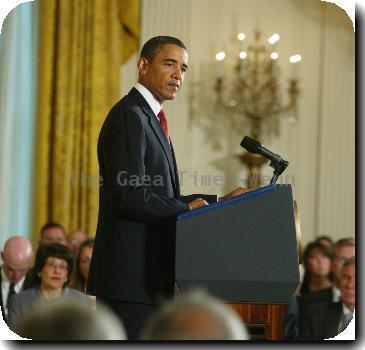North Korea calls for end of hostile relations with US in New Year’s message
By Kwang-tae Kim, APThursday, December 31, 2009
NKorea calls for end of hostile relations with US
SEOUL, South Korea — North Korea called for an end of hostile relations with the United States and renewed its commitment to a nuclear-free Korean peninsula in a New Year’s message Friday.
Communist North Korea has long demanded that Washington end hostility toward the regime, and said it developed nuclear weapons to deter a U.S. attack. Washington has repeatedly said it has no intention of invading the country.
The latest commitment brightened the prospect that Pyongyang may rejoin the stalled international talks aimed at ending its nuclear weapons programs in exchange for aid and other concessions. Washington has sought to coax Pyongyang to return to the talks, which also include South Korea, China, Russia and Japan.
The North has often said it is keen to replace an armistice that ended the 1950-53 Korean War with a peace treaty, and forge diplomatic relations with the U.S. as a way to win security guarantees — demands Washington says should be linked to Pyongyang’s verifiable denuclearization.
“The fundamental task for ensuring peace and stability on the Korean peninsula and in the rest of Asia is to put an end to the hostile relationship” between North Korea and the U.S., the North said in an editorial carried by the official Korean Central News Agency and in major newspapers.
North Korea’s traditional New Year’s Day statement, examined annually for clues to the regime’s policies for the coming year, also said the North is committed to establishing “a lasting peace system on the Korean peninsula and make it nuclear-free through dialogue and negotiations.”
The U.S. and North Korea agreed on the need to resume the negotiations during a trip to Pyongyang by President Barack Obama’s special envoy in early December, but North Korea did not make a firm commitment on when it would rejoin the talks.
North Korea quit the disarmament talks last year in anger over international criticism of a long-range rocket launch, which was denounced as a test of its missile technology. The regime then conducted a nuclear test and test-fired a series of ballistic missiles.
Friday’s editorial also stressed the need to improve the people’s standard of living by accelerating the development of light industry and agriculture while calling for efforts to gain access to more foreign markets, and undertake foreign trade.
“When the people’s living standards are decisively improved … the gate to a prosperous nation (will) be opened,” the English-language editorial quoted leader Kim Jong Il as saying.
The North recently redenominated its currency, the won, to curb runaway inflation and reassert control over its economy, and reportedly has also banned the use of foreign currency as of Jan. 1.
South Korea has voiced concerns that the currency revamp could trigger instability in North Korea that may pose a threat to the South.
The New Year’s message also appealed to North Korea’s 1.1 million-strong military to remain alert and ready to thwart any surprise attack by the enemy, while calling on its people to unite around leader Kim.
The lengthy message also said Pyongyang remains committed to improving its relations with South Korea, urging the South to refrain from taking actions that may aggravate tension.
The two Koreas are still technically at war and their relations soured badly after conservative South Korean President Lee Myung-bak took office in early 2008 with a tough policy on the North, with their navies engaging in a brief but bloody skirmish in November.
Pyongyang has set 2012 — the centenary of late North Korea’s founder Kim Il Sung’s birth — as a goal for building a “great, prosperous and powerful country.”
The impoverished country has relied on foreign aid to feed its 24 million population after natural disasters and mismanagement devastated its economy in the mid-1990s.
The regime introduced economic reforms in 2002, including street and farmers’ markets. But the government backtracked in 2006 after the reforms failed to revive the economy and resulted in an influx of foreign goods.
Tags: Asia, Barack Obama, East Asia, Foreign Aid, Lee Myung-bak, North America, North Korea, Pyongyang, Seoul, South Korea, United States

